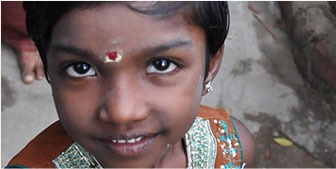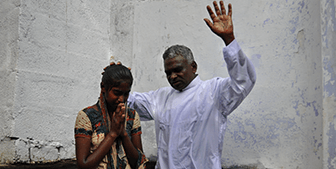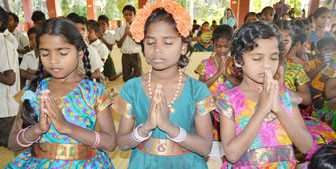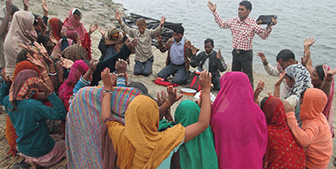Idols, Hinduism and Jesus
January 3rd, 2014 by Dan Jarvis | | Posted in Encouraging Stories, Homepage Stories, Mission Conversations

Community idols and sacred stones. There are millions of these displays throughout India.
Hindus make up some 13% of the world’s population, although the number is much larger when one accounts for all those who adhere to Hindu philosophy (New Age practices, etc.). Of course, in South Asia, the vast majority of the population is Hindu.
The religion began in 1500 B.C. as ritualistic polytheism practiced in homes, and over the years it has grown more and more complex, to the point now where there are millions of separate “gods” worshiped in Hinduism. Many of these gods are represented by idols or sacred objects held in a person’s household or in a community area.
Although Hinduism is extremely diverse, there are some common elements most believers share:
1. Ultimate reality for the Hindu, “Brahman,” is the impersonal force from which all things flow, and it is beyond distinctions, either moral or personal. The “self” is merely an extension of this universal oneness.
2. The “problem” with mankind is that most of us have forgotten the fact that we are part of Brahman, and thus have wrongly attached ourselves to separate “personalities” and “egos” (rather than remaining as part of the “one”). Because we are lost in individuality, we must now face laws of cause and effect, called ” karma.”
3. Karma follows a person through multiple lifetimes, as the “individual” is reincarnated until such a time as to be completely free from karma, at which point a Hindu believes they are “liberated” from life and death – reabsorbed into the universal “oneness” of Brahman.
What does the Bible say to Hindus?
1. Romans 1:25 speaks of a time when people worship created things rather than the Creator. It appears that Hinduism falls into this category, worshiping many different spirits. It is important to consider the Creator and His supreme place in the universe. The Bible explains how God’s power is greater than that of spirits; in fact, Jesus frees many people from their bondage and fear to evil spirits. (Read the Gospel of Mark for accounts of this.)
2. Humans were created in the image of God as individuals for specific purposes. The primary problem with mankind is not ignorance of divine connections, but rather rebellion against divine authority. Restoring God to His place of authority in our lives – putting our faith in Him – allows us to enter His family and become one of His treasured sons or daughters (John 1:12-13, Romans 8:15-17)
3. The laws of karma are certainly useful in understanding how evil impacts our lives. However, the Bible teaches that mankind only dies once, and after this, faces a personal judgment from God (Hebrews 9:27, Revelation 21:1-8).
4. There is no provision for forgiveness of sins in Hinduism, only the prospect of endless lifetimes of suffering to “pay” for the bad karma accrued when doing evil. Jesus Christ’s sacrifice can offer Hindus hope and cleansing from sin, so that people can be forgiven and free. Jesus died to take upon Himself the penalties and guilt for our sins. When we believe in Him, the Bible says that we are cleansed and made pure, and thus able to truly have fellowship with God our Creator.
______________
More resources regarding Hinduism can be found at Wikipedia, Probe Ministries, and the BBC.
Ways you can help
-

Sponsor a Child
-

Write To Child
-

Special Gift To Child
-

Unsponsored Children
Ways you can help
-

Sponsor A Nurse
-

Surgeries
-

Leprosy Care
-

Medical Camps
Ways you can help
-

Pastor Sponsorship
-

Bicycle
-

Discipleship Material
-

Bible Student Sponsorship
Ways you can help
-

Micro-Loans
-

Housing For Leprosy Victim
-

Clean Water
-

Nutritious Meals
Ways you can help
-

Order CGC Kits
-

Send a Child to a CGC
Ways you can help
-

Pastor and Family
-

Child Care
-

Grief Counseling and Prayer Gathering
-

Care Package
Ways you can help
-

Bible Student Sponsorship
-

Sign up for eNews
-

Barefoot Pastor Sponsorship
-

Send a Child to a CGC
Ways you can help
-

Order Copies
-

Pastor Sponsorship
-

Training Material
-

Equip Pastors